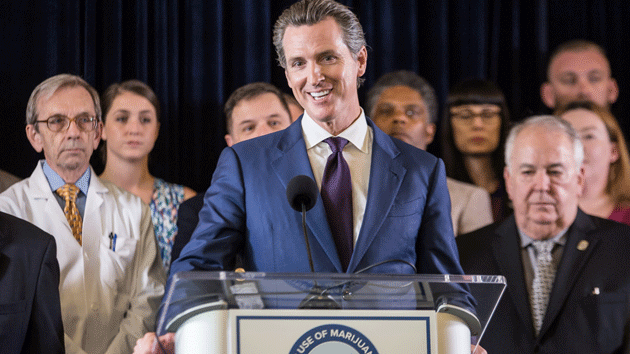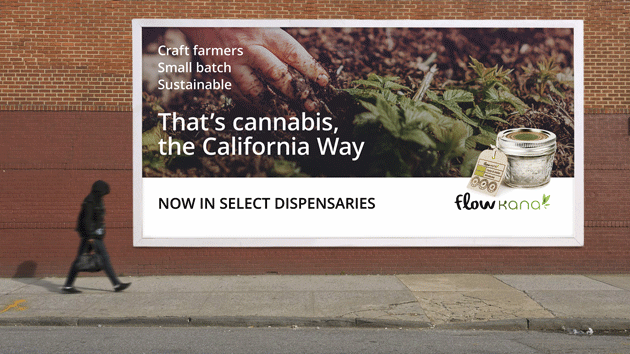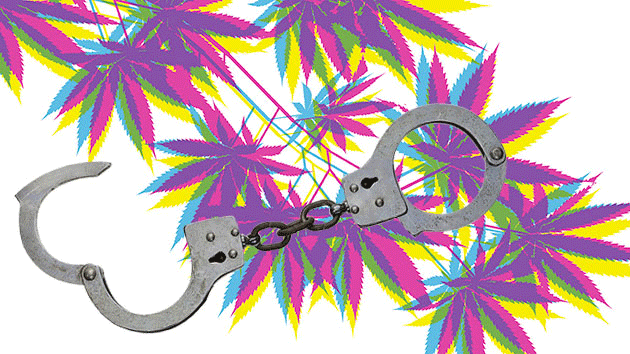
California Lt. Governor Gavin Newsom is the only statewide leader who has endorsed the Adult Use of Marijuana Act.
Last week, backers of an initiative to legalize marijuana in California declared that they’d collected enough signatures to place it on the November ballot. The news was announced by Lt. Governor Gavin Newsom, a declared 2018 gubernatorial candidate best known nationally for using his power as San Francisco’s mayor to greenlight same-sex marriages long before courts had sanctioned the practice.
That experience has encouraged Newsom to take bold positions on other social issues, including drug policy reform. I sat down with Newsom in downtown San Francisco to talk about legalization, his college bong photos (it’s not what you think), and how the experiences of other legal-pot states helped him craft the Adult Use of Marijuana Act.
Mother Jones: You have the distinction of being the only statewide office holder who supports legalization.
Gavin Newsom: It’s unfortunate. That’s not an indictment of my colleagues, it’s an indictment of the politics. The war on drugs is a political war, not a scientific war. If it was a scientific war, it would have collapsed under its own weight years ago.
MJ: Why haven’t more politicians come out in support of this?
GN: There is still a lot of big money to promote the status quo.
MJ: But when Californians had the chance to legalize marijuana in 2010 with Proposition 19, more money was spent in favor of the initiative than against it.
GN: Yeah, but that masks how politics works. You have outsized special interests that play huge in political campaigns. They didn’t play in that initiative, but they play profoundly in electoral politics with independent expenditures—not just direct contributions—that are holding the line on politicians from saying what they think.
MJ: What kinds of special interests? The alcohol industry?
GN: You name it. The United States has 5 percent of the world’s population and incarcerates 24 percent of its prisoners. There’s a lot of money behind that. Huge money behind it. Bail bondsman money. People say, “Oh, it’s prison guards.” It’s so much deeper than that. It gets into the politics of check cashers, the politics of payday lenders. It’s all connected. People don’t get what a big deal this is. This is about people’s heads being cut off south of the border. This is about families that are literally, 30 people, gunned down. This is about a bus with 50 kids and they’ve all disappeared. This is about corruption, cartels, the environment, tax dollars, waste and inefficiency, about kids that can’t hug their parents. This is about communities being ravaged and destroyed. This is about institutional racism and poverty. This is profound stuff, man. I get a little righteous here, because why the hell are you in politics if you can’t talk about this? If you can’t talk about this, then you don’t belong in politics. Either come out against our initiative or, if you don’t like the status quo, what the hell is your alternative? I’m all ears. But I don’t like the abdication—particularly in my party.
MJ: You’re probably not making any friends by saying all this.
GN: I am going to turn into the Ted Cruz of my party.
MJ: Well, your old college roommate probably likes you better than Cruz’s old roommate likes him.
GN: Yeah, probably. He was a big pot smoker, by the way. I wasn’t. You can call him. I don’t have to worry about the bong photo, okay? Except the beer one.
MJ: What motivated you to get involved in this issue?
GN: My foster brother lived in a Marin City housing project, a tough project at the time. He was living with us at the time of his 16th birthday, when his mom sent him a big bag of pot. It scared the hell out of him. I remember being freaked out by it. This is his mother. I remember it like it was yesterday. That young man ended up in San Quentin—a drug dealer. He’s out now, living in Marin City. He’s got five kids, and many more brothers and sisters with different fathers. I watched the sheriffs’ office arrest him half a dozen times—and not all the white folks at Redwood High School who were running around with cocaine in their BMWs.
My father was on the California Court of Appeals and he brought this into the home: He was just railing against mandatory minimums—how disgusted he was with the system, and with himself for perpetuating it.
When I got into elected office, I met the Drug Policy Alliance folks. We started passing resolutions condemning the disparity on cocaine sentencing, and [the DPA’s] Ethan Nadelman had me on panels. I kind of exposed myself and my position on marijuana [in 2012], and everyone said, “You’re finished!”
MJ: But by then you already had a rep for sticking your neck out—the whole gay marriage thing.
GN: I’d passed my sell-by date, man. After that, I had to be accountable to the position! A lot of folks began asking tough questions about what legalization looks like: How are you going to deal with Big Tobacco? How are you going to deal with the concerns around edibles and packaging? What tax rate do you support? Are you worried about kids? Are you worried about people driving under the influence? All of these legitimate questions were coming up in these forums, and discussions on the street, and, frankly, in my home with my wife. And that’s when I felt this responsibility to convene a workgroup. We put together a very thoughtful and comprehensive report to guide what was at the time a dozen-plus initiatives that were being discussed, proposed, and promoted. Ultimately, we landed on the one that we introduced today.
MJ: Several states have already legalized marijuana. What have you learned from their mistakes?
GN: California was the first to legalize medical marijuana, in 1996. I was mayor when we did the first regulations on the medical marijuana industry. Things were getting out of control: These things were popping up near parks, playgrounds, schools. Frankly, there was a lot of abuse—guys in gym outfits popping in and then selling cannabis just down the block. That is not what the voters intended with Prop. 215. So we got our arms around it. What we learned from Colorado and Washington is that you can’t be too prescriptive because there are things no one can anticipate. So we’ve built in flexibility in the taxation rate, how we process permits, how we deal with transportation, how we address legitimate concerns about Big Tobacco coming in and becoming Big Marijuana. We had more aggressive language on packaging edibles, transparency in testing, around the type of edibles you can use—and we allowed more flexibility of the legislature to completely change those if we turn out to be wrong. Colorado didn’t have those regulations. And Washington in particular struggled with the collision of medical and recreational: If you don’t tax one but you tax the other, everyone remains “sick.”
MJ: Yeah, California’s medical marijuana system is notoriously permissive. Back in 2010, I got a pot card for writer’s cramp.
GN: It’s a serious condition! [Laughs.] I can imagine that you have struggled and suffered through it and have been aided greatly.
MJ: Will I escape taxes under your initiative?
GN: You will be able to avoid sales tax. But you will have to pay a 15 percent excise tax that goes to children’s programs, law enforcement, and other functions. No one is saying this is perfect. But my hunch is that 10 years from now, you will have one system.
MJ: We don’t have a separate system for “medical alcohol.”
GN: Thank you. Though I am in the wine business and we do claim red wine has a benefit to your heart health, medical marijuana has a little more scientific backing.
MJ: Well, there is Fernet Branca.
GN: That’s true, too!
MJ: When Prop. 19 was coming up for a vote, I went to the Hemp Fest at the Cow Palace in Daly City.
GN: Look at you!
MJ: Prop. 19’s bankroller, Richard Lee, was speaking about why pot should be legal, and a fistfight nearly broke out between pot farmers and legalization advocates.
GN: I wasn’t prepared for that when we went up to Trinity and Humboldt counties. We had a town hall to end all town halls. It was intense. People were in the rafters. They were passionate. First of all, I said “marijuana.”
MJ: The M-word!
GN: The M-word is absolutely unacceptable up there. It’s cannabis. But there’s been a lot of opposition up there on 19. And so we really went an extra mile. We put in language that prioritizes small growers over larger ones for the first five years. We actually specifically exclude those larger cultivators so we can encourage local farmers.
MJ: Why do you think that’s important?
GN: They’ve put their lives on the line. They deserve a voice. Plus, it’s California. We have different terroir. We are an agricultural state. We value the small farmer. We value the organic grower. We value the farmers market. There’s an artisanal quality to what makes California great, and that quality exists in the cannabis community.
MJ: But what about small-time pot dealers, who are often people of color? You don’t see them at pot investment conferences. They’re the ones who get thrown in jail.
GN: We co-chaired this workgroup with the ACLU, and this was the fundamental issue. The war on drugs has been a war on poor people. So we have provisions that would allow people to participate in this industry without the burden of their previous mistakes impairing them. Folks that are still incarcerated with [certain pot-related] convictions will have the ability to petition courts to reduce their sentences or have records expunged. We want to give opportunities to people who have been disproportionately impacted by the war on drugs. And there’s money: 20 percent of the revenues are for economic development targeting low-income communities—like small grants and loans to help with expungement.
MJ: Where else will the money go?
GN: To children, youth, and family public safety. A huge amount will go into R&D. We will have the most robust [cannabis] research, arguably, of any country in the world—it will be coming out of our UC system in the next few years. This is a big deal.
MJ: Critics claim that legalization will convey to kids that smoking pot is okay.
GN: I get it. You don’t want to normalize something that isn’t healthy for kids. It’s not; it just isn’t, we dismiss that at our peril. We have to be honest about the brain development for children. Alcohol is not good for kids either, and tobacco is more devastating in many ways. But we don’t incarcerate people for smoking a cigarette. We don’t incarcerate people for having a beer.














